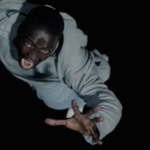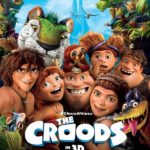Star Trek Into Darkness (d. J. J. Abrams USA 2013)
Star Trek Into Darkness (d. J. J. Abrams USA 2013)
Please read ‘On Reviews‘ for a guide to how I write film reviews.
Star Trek is considered to be one of the land marks of the Science Fiction Genre. The TV series graced our screens in 1966, 47 years ago. Star Trek the Motion Picture (d. Robert Wise USA 1979) took over the silver screen in 1979, 34 years ago. After 6 television shows and 10 films the franchise was rebooted with Star Trek (d. J. J. Abrams USA/Germany 2009). Being such a successful franchise with such a passionate audience, the pressure has been high, as beloved characters and concepts are remade for modern audiences. Star Trek met with a positive response, with a 95% rating on Rottentomatoes. The franchise, with a new cast, had been remade. Star Trek Into Darkness (d. J. J. Abrams USA 2013) looks to continue this success and further establish this new Universe. Despite the success of Star Trek, the pressure is still very much on.
One of the things that struck me with Star Trek Into Darkness, is the portrayal of the characters and the atmosphere of earth. Previous to the reboot, the Star Trek Universe was set in a time without racism, sexism or any internal political strife. Similarly, characters seldom showed any weaknesses or internal struggles. Everyone was the ‘ideal’ man and woman. The brave, couragous good guys who aren’t violent, or abusive – to himself or others. When this idea is changed its usually under alien influences. For example, Picard (Patrick Stewart) in Star Trek: First Contact (d. Jonathan Frakes USA 1996), behaves uncharacteristically with vengeance – like Captain Ahab from Moby Dick. However, his behaviour is largely due to his connections with the Borg – an alien race. In Star Trek Into Darkness, Captain Kirk (Chris Pine) is established early on as a passionate man but a self indulgent one – in contradiction with this idea. He can be emotional, he can be wreckless and he can be selfish. A trait not devoid from other characters. Scotty (Simon Pegg) drinks and characters can be violent to a point of it being morally questionable. The atmosphere between the original and the reboot is significant. In branching out to a new audience, the reboot depicts a more realistic world. Far from a weakness though, the characters are more interesting as a consequence of this new depiction. This does however, change the franchise’s basic themes.
Despite the big differences the film relies heavily upon the previous Universe. Spock (Leonard Nimoy) still makes an appearance to Spock (Zachary Quinto). We also see the return of familiar villains and consequently the return of some scenes – with subtle differences of course. This, importantly, requires a more in depth analysis and comparison, but for now it is an exciting echo of past films. It is, however, a shame that the film is dependant on past formulas and characters to progress it’s own revamped universe. But, perhaps the mirror Universe as a theme, deserves more credit and analysis than this.
Admittedly in this Universe, characters are more brittle, but something has to be said for the shock of seeing a Starfleet ship smash and fall. The once energy based battles have been replaced by something more brutal, more human. The visual effects are powerful, they’re visually appealing and offer an emotional impact. Though, more could be asked of the conceptual depictions of the aliens. Their differences, from the originals, far outweighing their similarities. Evidently, from the films effects, Star Trek Into Darkness asks for more excitement than before. Surprisingly, this doesn’t leave characters without very powerful moments.
The film offers more for the development and continuation of the Star Trek franchise than it does for the Science Fiction genre or film in general. (But I have to reward the use of fast Zooms in cinematography) This film is widely accessible and with very respecful performances. The effects are powerful and well thought out, creating a successful experience. Most of its weaknesses will be in comparison to the original franchise, but most of these aren’t significant. They fall to merely a ‘do we prefer one to the other’.
Further Reading








Leave a Reply